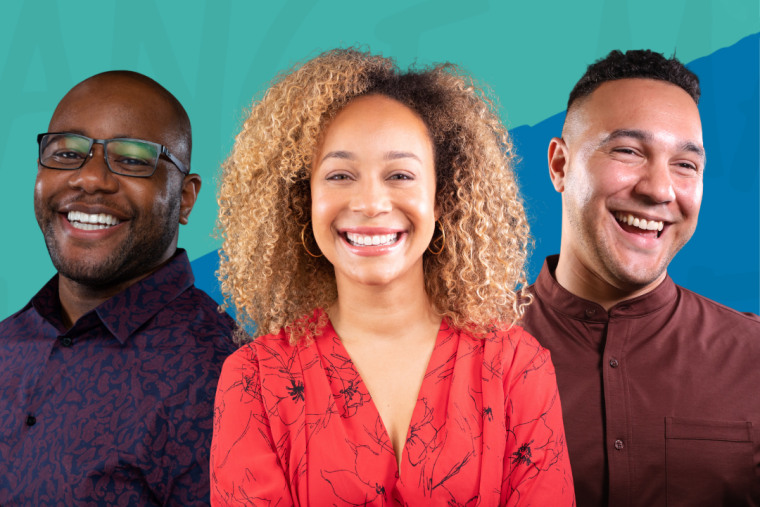Paris Alexandra and Alicia Ferguson founded BK Yoga Club in 2019 with just $350. Eventually, their sun-drenched studio in the Brooklyn borough of New York City brought in clientele who wanted body-positive yoga in a racially diverse community setting.
But then the pandemic hit. Last spring, BK Yoga Club lost nearly 75 percent of its business, Ferguson said. But they were one of a small fraction of Black-owned businesses that were able to weather the economic storm and are now one of 12 companies that earned a spot in a new mentorship and grant program started for Black startup companies.
The program announced by Blavity Inc. on Thursday was created to address how Black entrepreneurs are disproportionately underrepresented in the field and to expand Black economic advancement.
Blavity is a Black-owned company that runs five content brands like Shadow and Act and namesake news site Blavity that formed in 2014. The Growth Fellowship, a six-month program, gives each of the 12 participating businesses a $10,000 grant, access to corporate sponsors, and training in executive leadership, data analysis, pricing and hiring, among other things. The inaugural fellowship begins next month and will run twice a year.

“At Blavity, we have always been focused on giving back to our community, and with Blavity.org, we are directly supporting other entrepreneurs, like us, who need sponsorship,” said Jeff Nelson, Blavity.Inc co-founder and chief technology officer. “Our Growth Fellowship program will give entrepreneurs the tools and resources needed to scale their businesses, navigate the world of funding opportunities, and develop actionable strategies to drive long-term wealth and sustainability.”
The companies — FanBase Africa, Ceylon, Sip and Share Wines, Auda Beauty, Num Num Sauce, ColorStack.org, Qualifi, TheSip.com, Hiki, kidyouniversity, Indie Night Film Festival and BK Yoga Club —were selected out of 60 applicants.
“We want to give them the flexibility that this capital provides, but we want them to maintain their ownership and be able to reap those long term rewards,” Nelson said. “This is a growth fellowship. What we are looking for are startups that have some degree of success or attraction, and they're really at a point where an infusion of capital, and some mentorship, can really allow them to accelerate and grow.”
He said Blavity launched the program to address how Black people are less likely to pursue entrepreneurship and when they do, they’re less likely to succeed when compared to other racial groups: “Black businesses may have early success and traction because they get some early support from family and friends, or there's some initial hype, but they sort of hit that wall and they're unable to scale and grow. And so what we’re focused on is injecting capital,” he said.
Of the 20 percent of Black people who start businesses, just 4 percent survive the startup stage, according to the consulting firm McKinsey and Company. If the business does get off the ground, historical accumulations of debt make it disproportionately challenging to secure funds or advance in the industry, the report said.
As a result, just 5 percent of Black Americans hold some business equity compared to 15 percent of white Americans, the report said. Among equity holders, the average Black American’s business is worth 50 percent of the average American’s and a third of the average white American’s, the report said.
The pandemic dealt an additional blow to Black-owned businesses that were already facing financial hardships, the report said. About 58 percent experienced financial distress before the pandemic in comparison to roughly 27 percent of white-owned businesses, the report said. Between February and April 2020, 41 percent of Black-owned businesses permanently closed and more than half of the remaining businesses reported fear of closing too, the report said.
Alexandra and Ferguson of BK Yoga Club said they adjusted their business by retooling traditional methods, starting support groups, opening a wellness coffee shop and increasing their online presence to stay afloat during the pandemic.
“For us, it was pivoting our whole entire business model to be able to meet our community exactly where they're at and still deliver the same level of quality, figuring out how to still create these intimate atmospheres and these experiences with our clients,” Ferguson said.
Now, they bring in $10,000 per month, which helped them qualify for Blavity’s program.
Ferguson added, “There's a lot of challenges that come, so we're really looking forward to not only the financial capital that they're helping us with to give us that boost forward, but the partnerships, the mentorship, that we're going to receive. Teach us to fish, that's way more important.
